- Joined
- Oct 9, 2007
- Messages
- 47,423 (7.51/day)
- Location
- Hyderabad, India
| System Name | RBMK-1000 |
|---|---|
| Processor | AMD Ryzen 7 5700G |
| Motherboard | ASUS ROG Strix B450-E Gaming |
| Cooling | DeepCool Gammax L240 V2 |
| Memory | 2x 8GB G.Skill Sniper X |
| Video Card(s) | Palit GeForce RTX 2080 SUPER GameRock |
| Storage | Western Digital Black NVMe 512GB |
| Display(s) | BenQ 1440p 60 Hz 27-inch |
| Case | Corsair Carbide 100R |
| Audio Device(s) | ASUS SupremeFX S1220A |
| Power Supply | Cooler Master MWE Gold 650W |
| Mouse | ASUS ROG Strix Impact |
| Keyboard | Gamdias Hermes E2 |
| Software | Windows 11 Pro |
AMD today announced its Ryzen PRO 7040 line of processors for the all-important commercial notebook segment. A commercial notebook is a class of notebook that are purchased in large quantities by businesses or government organizations, to be handed out to their employees. The key distinction from consumer notebooks is their in-built security and remote-management features that let the organization remotely handle user credentials, securely store company data, and remotely deploy software updates. Most importantly, the organization maintains ownership over the device and can remotely de-activate it at whim. This is a particularly important market segment for both AMD and Intel (which sells 13th Gen Core vPro processors). AMD's launch today includes Ryzen PRO 7040 series mobile processors for both the 15 W to 28 W ultraportable, and 35 W to 55 W thin-and-light (mainstream) commercial notebook form-factors.
At the heart of the Ryzen PRO 7040 series processors is the 4 nm "Phoenix" silicon, which combines the "Zen 4" microarchitecture for the CPU, with RDNA3 graphics architecture for the iGPU, and introduces the Ryzen AI on-die accelerator based on the Xilinx-designed XDNA architecture, to the commercial notebook segment. The silicon physically features an 8-core/16-thread "Zen 4" CPU, with several processor models boosting to the 5.00 GHz-mark. Each core has 1 MB of dedicated L2 cache, and the eight cores share a 16 MB L3 cache. The iGPU meets full DirectX 12 Ultimate logo requirements, and features 12 RDNA3 compute units, which work out to 768 dual issue-rate stream processors, 24 AI Accelerators (intrinsic to RDNA3 and not related to Ryzen AI); and 12 Ray Accelerators, besides 48 TMUs and industry-leading 32 ROPs. AMD is backing the iGPU on these processors with AMD Software PRO (the same class of drivers as Radeon PRO GPUs), which come with superior support from AMD, and special packages for remote deployment by organizations.
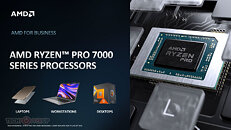
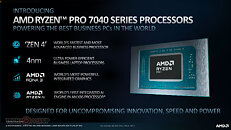
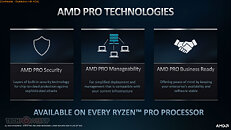
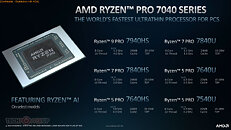
Ryzen AI is a comprehensive hardware accelerator for AI workloads, with a peak performance of 10 TOP/s. Curently it supports ONNX and TensorFlow model formats, but AMD hopes to add PyTorch support toward the end of 2023, when the company will also release the AMD Unified AI Stack, which consists of APIs that let ISVs develop software that take advantage of not just the Ryzen AI accelerator, but also the AI Accelerators of the RDNA3 compute units, and the "Zen 4" CPU cores, with their modern ISA that includes bfloat16, VNNI, and AVX-512 instruction sets; for a whole-of-silicon approach to AI acceleration. Microsoft is already integrating Ryzen AI support with Windows 11, and AMD claims that OEMs are developing their own software and security features that use it.



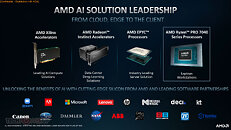
AMD is betting on software that require on-device AI acceleration as opposed to cloud-based AI workload computing. There are several applications for AI relevant to the commercial computing space, including image processing and manipulation, GPTs such as Microsoft Office Co-pilot, and AI based data-analytics (making sense of presentations and large spreadsheets), all without data leaving the device. The Ryzen AI accelerator uses 20 AI Engine tiles, along with localized memory, and adaptive interconnect that links each AIE tile to several other tiles.
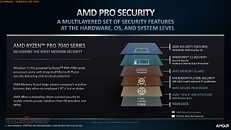
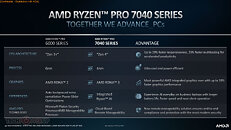

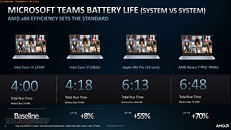
AMD is including the full stack of AMD PRO features, which include PRO Security (7-layer data security including secure enclave, memory encryption, and other microarchitectural hardening); PRO Management (remote management of the device by the organization's sysadmins); and PRO Business (a special support channel by AMD for organizations, helping them manage the hardware and software of their notebooks under deployment).
There are two distinct classes of Ryzen PRO 7040 mobile processors—the 35 W to 54 W "thin-and-light" segment consists of the Ryzen 9 PRO 7940HS, Ryzen 7 PRO 7840HS, and the Ryzen 5 PRO 7640HS. The 15 W to 28 W "ultraportable" segment also has three models—the Ryzen 7 PRO 7840U, Ryzen 5 PRO 7640U, and the Ryzen 5 PRO 7540U. All models except the 7540U get Ryzen AI. All Ryzen 7 and Ryzen 9 models feature 8-core/16-thread CPU, while all Ryzen 5 ones are 6-core/12-thread. There are three kinds of iGPUs, the Radeon PRO 780M (12 CU or 768 stream processors), Radeon PRO 760M (8 CU or 512 stream processors), and Radeon PRO 740M (6 CU or 384 stream processors).
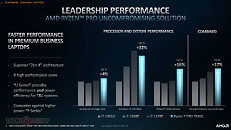
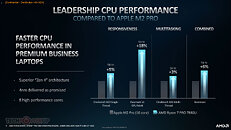
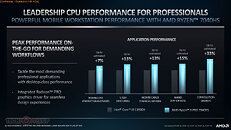
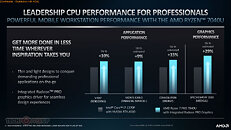
In terms of performance, AMD is claiming that the Ryzen 7 PRO 7840U provides superior performance to the Apple M2 Pro (10-core) powering certain MacBook Pro models; while the Ryzen 9 PRO 7940HS is shown beating the Intel Core i9-13900H in a variety of business and productivity benchmarks. The Ryzen 7 PRO 7840U offers up to 29% higher graphics performance than an Intel Core i7-1370P with NVIDIA RTX A500 discrete graphics. The processor also beats the Intel+NVIDIA combo in a variety of business benchmarks such as Monte Carlo and Convolution.

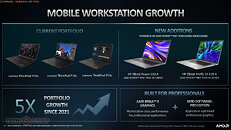
AMD has scored several commercial notebook design wins with Lenovo and HP for their 2023 portfolios. These span brands popular with large enterprises, such as the ThinkPad Z-series, ThinkPad T-series, ThinkPad L-series, and ThinkPad E-series, from Lenovo; and the HP EliteBook 8-series, 6-series, 4-series, and 2-series; spanning a variety of screen-sizes, thickness, and portability classes.
View at TechPowerUp Main Site
At the heart of the Ryzen PRO 7040 series processors is the 4 nm "Phoenix" silicon, which combines the "Zen 4" microarchitecture for the CPU, with RDNA3 graphics architecture for the iGPU, and introduces the Ryzen AI on-die accelerator based on the Xilinx-designed XDNA architecture, to the commercial notebook segment. The silicon physically features an 8-core/16-thread "Zen 4" CPU, with several processor models boosting to the 5.00 GHz-mark. Each core has 1 MB of dedicated L2 cache, and the eight cores share a 16 MB L3 cache. The iGPU meets full DirectX 12 Ultimate logo requirements, and features 12 RDNA3 compute units, which work out to 768 dual issue-rate stream processors, 24 AI Accelerators (intrinsic to RDNA3 and not related to Ryzen AI); and 12 Ray Accelerators, besides 48 TMUs and industry-leading 32 ROPs. AMD is backing the iGPU on these processors with AMD Software PRO (the same class of drivers as Radeon PRO GPUs), which come with superior support from AMD, and special packages for remote deployment by organizations.




Ryzen AI is a comprehensive hardware accelerator for AI workloads, with a peak performance of 10 TOP/s. Curently it supports ONNX and TensorFlow model formats, but AMD hopes to add PyTorch support toward the end of 2023, when the company will also release the AMD Unified AI Stack, which consists of APIs that let ISVs develop software that take advantage of not just the Ryzen AI accelerator, but also the AI Accelerators of the RDNA3 compute units, and the "Zen 4" CPU cores, with their modern ISA that includes bfloat16, VNNI, and AVX-512 instruction sets; for a whole-of-silicon approach to AI acceleration. Microsoft is already integrating Ryzen AI support with Windows 11, and AMD claims that OEMs are developing their own software and security features that use it.




AMD is betting on software that require on-device AI acceleration as opposed to cloud-based AI workload computing. There are several applications for AI relevant to the commercial computing space, including image processing and manipulation, GPTs such as Microsoft Office Co-pilot, and AI based data-analytics (making sense of presentations and large spreadsheets), all without data leaving the device. The Ryzen AI accelerator uses 20 AI Engine tiles, along with localized memory, and adaptive interconnect that links each AIE tile to several other tiles.




AMD is including the full stack of AMD PRO features, which include PRO Security (7-layer data security including secure enclave, memory encryption, and other microarchitectural hardening); PRO Management (remote management of the device by the organization's sysadmins); and PRO Business (a special support channel by AMD for organizations, helping them manage the hardware and software of their notebooks under deployment).
There are two distinct classes of Ryzen PRO 7040 mobile processors—the 35 W to 54 W "thin-and-light" segment consists of the Ryzen 9 PRO 7940HS, Ryzen 7 PRO 7840HS, and the Ryzen 5 PRO 7640HS. The 15 W to 28 W "ultraportable" segment also has three models—the Ryzen 7 PRO 7840U, Ryzen 5 PRO 7640U, and the Ryzen 5 PRO 7540U. All models except the 7540U get Ryzen AI. All Ryzen 7 and Ryzen 9 models feature 8-core/16-thread CPU, while all Ryzen 5 ones are 6-core/12-thread. There are three kinds of iGPUs, the Radeon PRO 780M (12 CU or 768 stream processors), Radeon PRO 760M (8 CU or 512 stream processors), and Radeon PRO 740M (6 CU or 384 stream processors).




In terms of performance, AMD is claiming that the Ryzen 7 PRO 7840U provides superior performance to the Apple M2 Pro (10-core) powering certain MacBook Pro models; while the Ryzen 9 PRO 7940HS is shown beating the Intel Core i9-13900H in a variety of business and productivity benchmarks. The Ryzen 7 PRO 7840U offers up to 29% higher graphics performance than an Intel Core i7-1370P with NVIDIA RTX A500 discrete graphics. The processor also beats the Intel+NVIDIA combo in a variety of business benchmarks such as Monte Carlo and Convolution.


AMD has scored several commercial notebook design wins with Lenovo and HP for their 2023 portfolios. These span brands popular with large enterprises, such as the ThinkPad Z-series, ThinkPad T-series, ThinkPad L-series, and ThinkPad E-series, from Lenovo; and the HP EliteBook 8-series, 6-series, 4-series, and 2-series; spanning a variety of screen-sizes, thickness, and portability classes.
View at TechPowerUp Main Site


